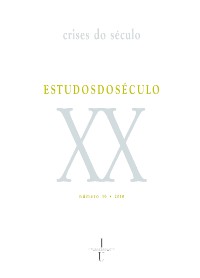Please use this identifier to cite or link to this item:
https://hdl.handle.net/10316.2/36440| DC Field | Value | Language |
|---|---|---|
| dc.contributor.author | Frias, Aníbal | - |
| dc.date.accessioned | 2015-04-16T16:15:57Z | |
| dc.date.accessioned | 2020-09-24T05:13:28Z | - |
| dc.date.available | 2015-04-16T16:15:57Z | |
| dc.date.available | 2020-09-24T05:13:28Z | - |
| dc.date.issued | 2010 | - |
| dc.identifier.issn | 1645-3530 | - |
| dc.identifier.issn | 1647-8622 (digital) | - |
| dc.identifier.uri | https://hdl.handle.net/10316.2/36440 | - |
| dc.description.abstract | Pessoa, sob o prisma da poesia, é um espectador/ actor privilegiado do cenário moderno que surge ao virar do século XX. Atento às mudanças da época, vê nelas sinais, vira-se para um futuro que deseja à altura do passado das Descobertas. Explorámos três registos: as mudanças psicossociais próprias às metrópoles; o poder faustiano das máquinas; e o capitalismo emergente. O Quinto Império utópico é visto pelo poeta como uma solução para aquilo que diagnostica de «decadência » de fim de século e para os problemas sociopolíticos do país. Estas áreas são índices críticos com sentido duplo enquanto eventos perturbadores da antiga ordem e momentos reveladores do andamento do mundo, onde se manifesta, no coração da modernidade, uma atitude anti-moderna. | por |
| dc.description.abstract | Pessoa, au prisme de la poésie, est un spectateur-acteur privilégié de la scène moderne qui émerge au tournant du XXe siècle. Scrutant les bouleversements de son époque, où il voit autant de signes, il se tourne vers un avenir qu’il désire à la hauteur du passé des Découvertes. Nous avons exploré trois registres: les changements psychosociaux dus aux métropoles; la puissance faustienne des machines; et le capitalisme émergeant. Le Quint Empire utopique est envisagé par le poète comme solution à ce qu’il diagnostique comme une «décadence» fin-de-siècle et aux problèmes sociopolitiques du pays. Ces domaines constituent des indices critiques en un double sens: en tant qu’événements perturbateurs de l’ordre ancien et en tant que moments révélateurs du cours du monde, où se manifeste, au coeur de la modernité, une attitude antimoderne. | fra |
| dc.description.abstract | Pessoa, regarding poetry, is a privileged spectator/actor of modern scenery which appears at the turn of the 20th Century. Savvy to the changes of the period, he sees in them signs, turning towards a future which he desires reaches the same height of the Discoveries. We explore three records: the psychosocial changes in keeping with metropolis; the Faustian power of machines; and the emerging capitalism. The utopian Fifth Empire is seen by the poet as a solution to what he identifies as the «decadence» of the end of the century and the sociopolitical problems of the country. These areas are critical indexes with double meaning as regards to being disturbing events of the old order and revealing moments of the direction of the world, where in the heart of modernity, an anti-modern attitude is manifested. | eng |
| dc.language.iso | fra | - |
| dc.publisher | Imprensa da Universidade de Coimbra | - |
| dc.subject | Fernando Pessoa | eng |
| dc.subject | Modernity | eng |
| dc.subject | Metropolis | eng |
| dc.subject | Technique | eng |
| dc.subject | Fifth Empire | eng |
| dc.subject | Fernando Pessoa | fra |
| dc.subject | Modernité | fra |
| dc.subject | Métropole | fra |
| dc.subject | Technique | fra |
| dc.subject | Quint Empire | fra |
| dc.subject | Fernando Pessoa | por |
| dc.subject | Modernidade | por |
| dc.subject | Metrópole | por |
| dc.subject | Técnica | por |
| dc.subject | Quinto Império | por |
| dc.title | Fernando Pessoa moderne et antimoderne: grandeur et «décadence» des Temps Modernes | por |
| dc.title.alternative | Fernando Pessoa moderno e anti-moderno: grandeza e «decadência» dos tempos modernos | por |
| dc.title.alternative | Fernando Pessoa as modern and anti-modern: greatness and «decadence» of modern times | por |
| dc.type | article | - |
| uc.publication.collection | Revista Estudos do Século XX nº 10 | - |
| uc.publication.firstPage | 279 | - |
| uc.publication.issue | 10 | - |
| uc.publication.lastPage | 296 | - |
| uc.publication.location | Coimbra | - |
| uc.publication.journalTitle | Revista Estudos do Século XX | - |
| dc.identifier.doi | 10.14195/1647-8622_10_17 | - |
| uc.publication.section | Crise, decadência e regeneração | - |
| uc.publication.orderno | 18 | - |
| uc.publication.area | Ciências Sociais | - |
| uc.publication.manifest | https://dl.uc.pt/json/iiif/10316.2/36440/239097/manifest?manifest=/json/iiif/10316.2/36440/239097/manifest | - |
| uc.publication.thumbnail | https://dl.uc.pt/retrieve/11605468 | - |
| item.grantfulltext | open | - |
| item.fulltext | With Fulltext | - |
| Appears in Collections: | Revista Estudos do Século XX | |
Files in This Item:
| File | Description | Size | Format | |
|---|---|---|---|---|
| fernando_pessoa_moderne_et_antimoderne.pdf | 1.08 MB | Adobe PDF |  |
Items in DSpace are protected by copyright, with all rights reserved, unless otherwise indicated.
